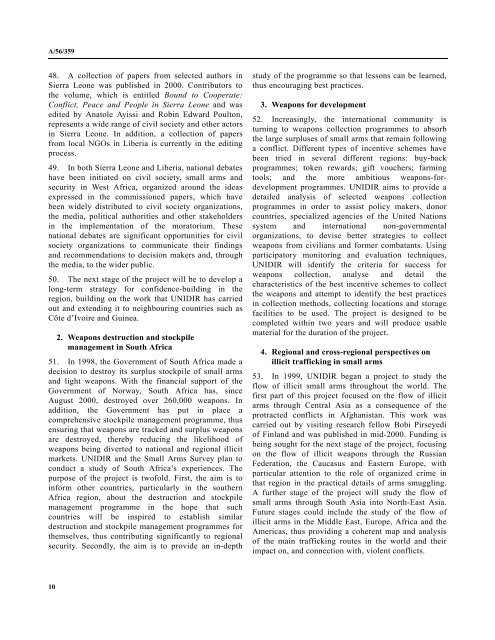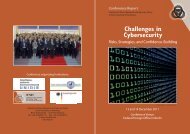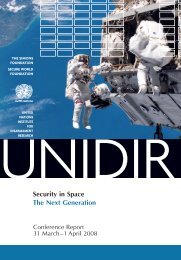General Assembly - UNIDIR
General Assembly - UNIDIR
General Assembly - UNIDIR
Create successful ePaper yourself
Turn your PDF publications into a flip-book with our unique Google optimized e-Paper software.
A/56/359<br />
48. A collection of papers from selected authors in<br />
Sierra Leone was published in 2000. Contributors to<br />
the volume, which is entitled Bound to Cooperate:<br />
Conflict, Peace and People in Sierra Leone and was<br />
edited by Anatole Ayissi and Robin Edward Poulton,<br />
represents a wide range of civil society and other actors<br />
in Sierra Leone. In addition, a collection of papers<br />
from local NGOs in Liberia is currently in the editing<br />
process.<br />
49. In both Sierra Leone and Liberia, national debates<br />
have been initiated on civil society, small arms and<br />
security in West Africa, organized around the ideas<br />
expressed in the commissioned papers, which have<br />
been widely distributed to civil society organizations,<br />
the media, political authorities and other stakeholders<br />
in the implementation of the moratorium. These<br />
national debates are significant opportunities for civil<br />
society organizations to communicate their findings<br />
and recommendations to decision makers and, through<br />
the media, to the wider public.<br />
50. The next stage of the project will be to develop a<br />
long-term strategy for confidence-building in the<br />
region, building on the work that <strong>UNIDIR</strong> has carried<br />
out and extending it to neighbouring countries such as<br />
Côte d’Ivoire and Guinea.<br />
2. Weapons destruction and stockpile<br />
management in South Africa<br />
51. In 1998, the Government of South Africa made a<br />
decision to destroy its surplus stockpile of small arms<br />
and light weapons. With the financial support of the<br />
Government of Norway, South Africa has, since<br />
August 2000, destroyed over 260,000 weapons. In<br />
addition, the Government has put in place a<br />
comprehensive stockpile management programme, thus<br />
ensuring that weapons are tracked and surplus weapons<br />
are destroyed, thereby reducing the likelihood of<br />
weapons being diverted to national and regional illicit<br />
markets. <strong>UNIDIR</strong> and the Small Arms Survey plan to<br />
conduct a study of South Africa’s experiences. The<br />
purpose of the project is twofold. First, the aim is to<br />
inform other countries, particularly in the southern<br />
Africa region, about the destruction and stockpile<br />
management programme in the hope that such<br />
countries will be inspired to establish similar<br />
destruction and stockpile management programmes for<br />
themselves, thus contributing significantly to regional<br />
security. Secondly, the aim is to provide an in-depth<br />
study of the programme so that lessons can be learned,<br />
thus encouraging best practices.<br />
3. Weapons for development<br />
52. Increasingly, the international community is<br />
turning to weapons collection programmes to absorb<br />
the large surpluses of small arms that remain following<br />
a conflict. Different types of incentive schemes have<br />
been tried in several different regions: buy-back<br />
programmes; token rewards; gift vouchers; farming<br />
tools; and the more ambitious weapons-fordevelopment<br />
programmes. <strong>UNIDIR</strong> aims to provide a<br />
detailed analysis of selected weapons collection<br />
programmes in order to assist policy makers, donor<br />
countries, specialized agencies of the United Nations<br />
system and international non-governmental<br />
organizations, to devise better strategies to collect<br />
weapons from civilians and former combatants. Using<br />
participatory monitoring and evaluation techniques,<br />
<strong>UNIDIR</strong> will identify the criteria for success for<br />
weapons collection, analyse and detail the<br />
characteristics of the best incentive schemes to collect<br />
the weapons and attempt to identify the best practices<br />
in collection methods, collecting locations and storage<br />
facilities to be used. The project is designed to be<br />
completed within two years and will produce usable<br />
material for the duration of the project.<br />
4. Regional and cross-regional perspectives on<br />
illicit trafficking in small arms<br />
53. In 1999, <strong>UNIDIR</strong> began a project to study the<br />
flow of illicit small arms throughout the world. The<br />
first part of this project focused on the flow of illicit<br />
arms through Central Asia as a consequence of the<br />
protracted conflicts in Afghanistan. This work was<br />
carried out by visiting research fellow Bobi Pirseyedi<br />
of Finland and was published in mid-2000. Funding is<br />
being sought for the next stage of the project, focusing<br />
on the flow of illicit weapons through the Russian<br />
Federation, the Caucasus and Eastern Europe, with<br />
particular attention to the role of organized crime in<br />
that region in the practical details of arms smuggling.<br />
A further stage of the project will study the flow of<br />
small arms through South Asia into North-East Asia.<br />
Future stages could include the study of the flow of<br />
illicit arms in the Middle East, Europe, Africa and the<br />
Americas, thus providing a coherent map and analysis<br />
of the main trafficking routes in the world and their<br />
impact on, and connection with, violent conflicts.<br />
10








